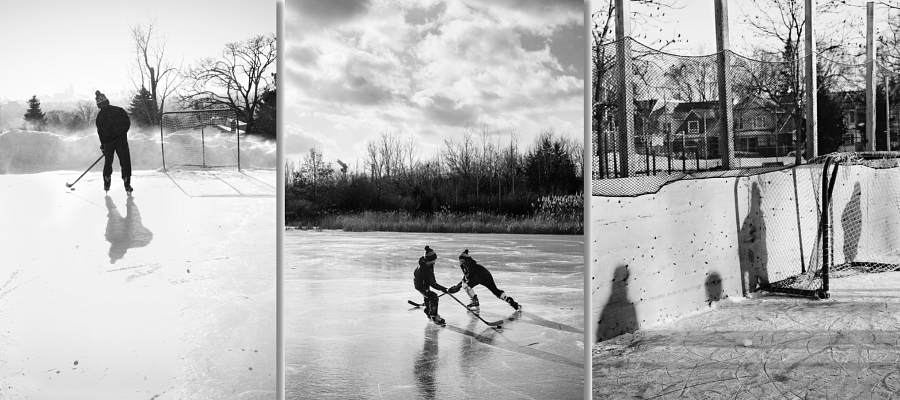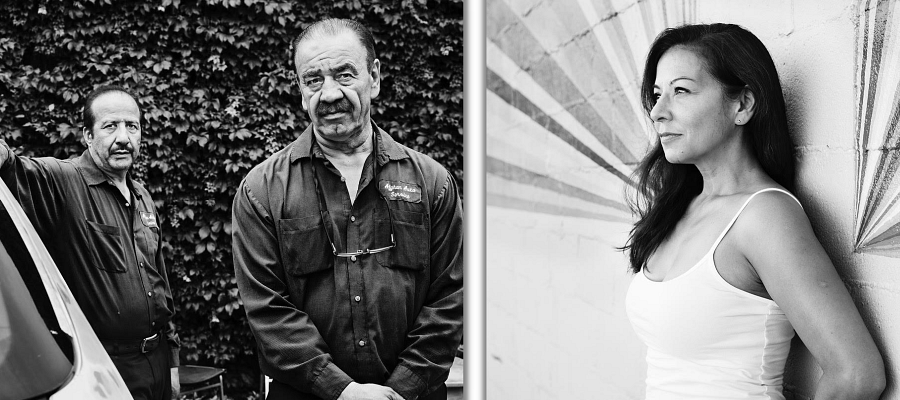“I have always loved photography and knew I would be an artist as a young child,” shares Tobi Asmoucha, professional photographer and instructor in our Broadcasting and Photography programs. Tobi has taught at the School of Communications, Media, Arts and Design for nearly a decade, but her passion for this creative field was evident in her childhood.
“When I was around seven, I started rearranging the family photo albums, so now when you look at these old albums, nothing is chronological. I truly love playing with photographs and feel lucky my family wasn’t concerned with what happened to the family heirlooms,” she says.
Fast forward to grade nine, Tobi explains she had the opportunity to do a short darkroom photography class. It was then when her chemistry teacher, who was the one running it, presented her with an opportunity that ultimately foreshadowed Tobi’s future -- if she could teach the class, she would have darkroom access. “I really have to thank my chemistry teacher Jim for his mentorship with photography and teaching,” she shares.
After high school, Tobi would do small jobs through her network in university. However, her career as a professional photographer grew when she graduated. “I was working part-time and assisting and building my own projects that I was trying to get published,” she adds. Since then, Tobi has continued to pursue a career in photography, which is now going on thirty years, and her portfolio of work and accomplishments highlight her outstanding talent.
Tobi plays an instrumental role at our school, and her knowledge provides students with real-world skills they can develop and carry well into their careers after graduation. Reflecting on her favourite part about teaching, she shares, “I love it when I can see a student’s work evolve and show themselves in it.”
Below is a photography Q&A that provides an inside look at Tobi’s expertise, career, style of photography, exhibitions, and more.
WHAT’S YOUR STYLE OF PHOTOGRAPHY, AND HAS IT TRANSFORMED OVER TIME?
My personal documentary style is about community and the idea of home, and that hasn’t changed. I love learning about new things through my work, places and ideas I wouldn’t have been exposed to without my camera. When it comes down to it, my core way of seeing hasn’t changed, although what I am compelled to photograph evolves. Connecting to individuals I meet through my photography is still about personal connection. As my life has changed with different responsibilities and influences, my work reflects that too. I think that themes of identity, resilience and home still play through my work. I still love working in black and white.
DO YOU HAVE ANY PARTICULAR TECHNIQUES THAT YOU UTILIZE TO CREATE A UNIQUE SHOT OR ONE THAT PORTRAYS A MESSAGE?
For my documentary work, I keep my equipment simple so that it doesn't get in the way of the moments happening. The car always has a lot of equipment waiting just in case; a little bounced flash or a reflector is enough to add to the image without changing the atmosphere that shows the people. I need to be able to connect to the people I'm photographing, so having a simple setup keeps it easier for that. I'm also a stickler for editing my work.
AS A CREATIVE PERSON, HOW DO YOU STAY INSPIRED AND MOTIVATED?
I love to photograph and know that I am happiest and feel my best self when photographing, whether it is a freelance job or my own project. If I feel the compulsion to photograph something, I try to follow that; I don't always need to know why while I'm doing it. Often, I start with an idea of why I want to photograph something, but that is external. The important motives come through making the work and are more intuitive and connected to my background and experiences.
I also have to have moments in my life that aren't just routine to keep creative. I've always needed to build a little wonder time into my day-to-day where I don't know what will happen. My nature ice rinks series came out of a need to stay creative in the winter. As a freelance photographer, I am not as busy in January and February, so I needed something to keep me motivated to get outside and do what I enjoy. Having my own projects keeps me motivated and connected to why I love taking photographs.

WHAT HAS BEEN YOUR MOST REWARDING EXPERIENCE AS A PHOTOGRAPHER?
I’m not sure, as sometimes the smaller jobs you weren’t expecting turn into something where you meet and experience something you wouldn’t have known about without being sent there for a job. Many years ago, for a Toronto Life job, I was photographing the community in Toronto from Afghanistan, and there was a quick turnaround for the photography. I was worried about access with the different people all over the city, and somehow it just flowed, and everyone opened their doors to me. Instead of me worrying about asking people where they were from and their story, they were asking me where I was from. It was a wonderful turn of hospitality and curiosity on both sides.
WHAT’S INVOLVED WHEN CURATING AN EXHIBITION?
It actually involves a lot of time thinking about the work, looking at it, and going back later to see it with different eyes. I really can't see my own personal work at first. I usually don't recognize what is really there initially as I'm still part of the moment that it happened. I need time to process and visit the work later. The images that hold themselves separate from the actual moment in time that have their own lives are the ones that rise through.
I also have close friends whose opinions I trust, and I share work with them to help with the editing. I think you need others to step in for the editing, as it is hard to be objective with work close to you. Some images you know from the beginning, and others sometimes come through in a different way than you thought, and they are stronger. I make work prints and play with the sequencing, and then after I've selected the images for a show, I often do mock-ups to help with the sizing and hanging.
DO YOU HAVE AN EXHIBITION (OR A COUPLE) THAT STANDS OUT TO YOU?
I have some work showing till March 5th in Palermo in a multi-media international exhibition that is part of a book called Photography in the Visual Culture. The images in this exhibition are personal photographs of my daughter taken during the lockdown; it feels really amazing to see something of our tiny moments. When taking these photos, I remember thinking about how I will work again as my freelance work ground to a halt. We took the photographs together to connect and see our lives change. This time of pandemic and fleeting adolescence had a real value to me as a documentary artist and a mother, and I am grateful that the work has its own life now.
I also think of the Legion Hall series of photographs that were exhibited at the Canadian War Museum. It was so great to have these images shown in a place open to so many people from different backgrounds and people from the Royal Canadian Legion. And this body of work became a travelling exhibition, so it was seen in many places across Canada. It started from a job I had with Canadian Geographic and turned into a personal project; it feels quite magic when that happens.

DO YOU HAVE A PARTICULAR AWARD THAT YOU HAVE WON THAT STICKS OUT TO YOU OR THAT YOU HAVE A FOND MEMORY OF WHEN RECEIVING IT?
I just received an award for an image from a project called After Refuge that I’ve been working on since 2017, so that was very affirming, as when you are doing a personal project for many years, it can feel that you are working alone in a quiet corner. It is a long time to continue with a project without feedback, and I wanted to ensure I was honouring the people who had graciously shared their stories with me.
WHAT'S ONE THING YOU WISH YOU HAD KNOWN WHEN YOU FIRST STARTED AS A PHOTOGRAPHER, AND WHAT ADVICE DO YOU HAVE FOR FUTURE PHOTOGRAPHERS?
I wish I knew more about the business end of photography; I love that the students have more work experiences now. My advice for future photographers is to really try all different kinds of photography while you are in school and see what feels right for you; this is your time to experiment. When you start showing your work out of school, show the kind of work you love to do and keep working on your own photography projects.
Learn more about Tobi’s exhibitions and awards here, and be sure to check out her Instagram @tobi_asmoucha for more photographs.
Check out and subscribe to our Storyteller newsletter and Storyteller In-Depth Podcast for more great stories from the School of Communications, Media, Arts and Design.
